She lost her triplets at 24 weeks pregnant – her rainbow baby came through adoption
Stay-at-home mum Natalie Tan shares her journey as an adoptive mother to baby Hannah, who came home to her husband and her in August last year, at seven weeks old. As told to CNA Women’s Sharon Salim.
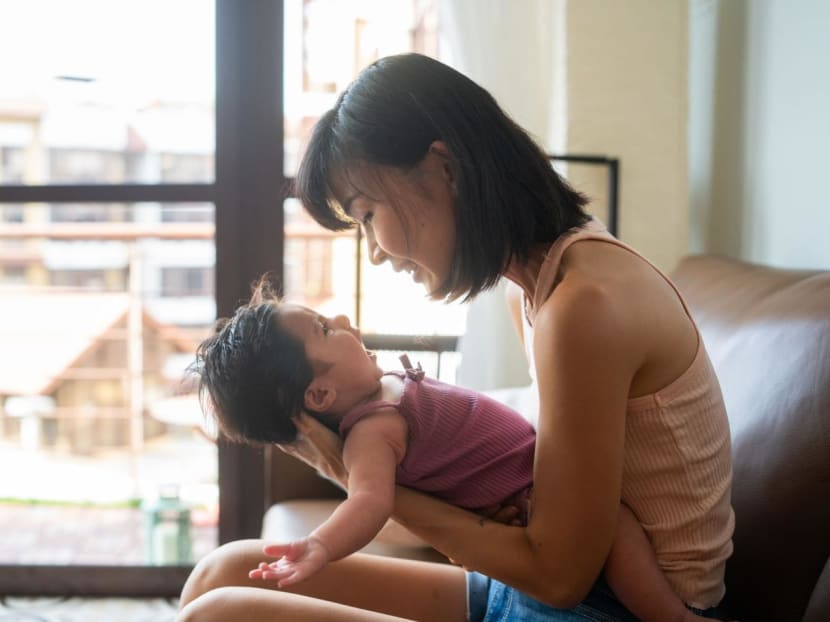
The 34-year-old mother reflects on her journey as a new mum to baby Hannah, whose name means "grace" or "beautiful blessing". (Photo: Natalie Tan)
My husband Florian and I considered adoption long before we got married in 2018. We used to talk about it – but we’d always imagined having biological children first before adopting.
Things didn’t exactly turn out to be how we imagined it: My husband and I lost our triplets in my 24th week of pregnancy, after having conceived for the first time via intrauterine insemination (IUI), in 2019. In IUI, the man’s sperm is placed directly into the woman’s womb so that pregnancy can take place.
After the loss, we thought we would let my body rest for a while before trying for a baby again. We did another round of IUI, which failed, before switching to in-vitro fertilisation (IVF).
We’d always imagined having biological children first before adopting.
Several scans later, our fertility doctor told us that there was severe uterine scarring in my womb caused by Asherman’s Syndrome, a medical condition where scar tissue builds up in the uterus. He explained that the amount of healthy tissue left in my uterus was minimal, and while nothing is impossible, the probability of me falling pregnant again would be very slim.
While we were undergoing IVF, Florian and I had decided to also look into the adoption process, hoping that we could start a family soon.
ADOPTING HANNAH AND BRINGING HER HOME
It was August 2021, after the National Day weekend, when we received a call about a potential match through a local adoption agency – it was surreal and very unexpected.
The next day, we saw her photo and thought she’d fit into our family. We named her Hannah, which means "grace". We thought the name fit her perfectly as she came to us as a beautiful blessing.
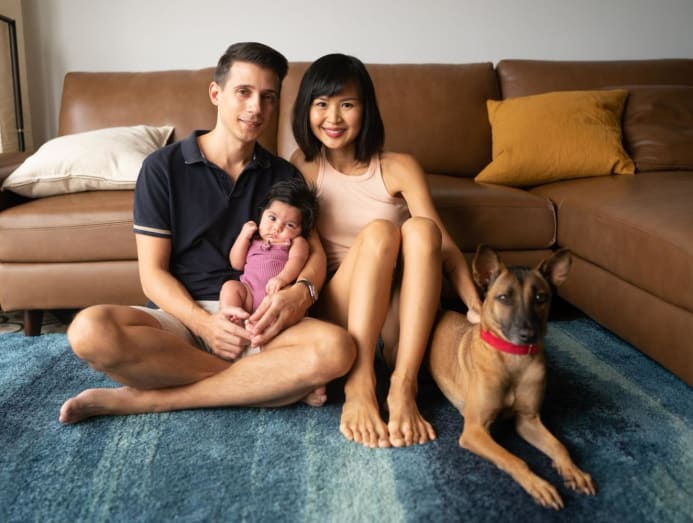
The first weekend that we brought Hannah home, she was seven weeks old, and everything was still like a dream – all was fine and good. The reality only hit when I felt a bigger change as a mum.
I wouldn’t know what a birth mother experiencing postnatal depression would feel, but I imagined it would be similar: Can I cope? What if I can’t bond with this baby? Am I responding correctly? Why is she not responding to me?
During the times Hannah cried, I didn’t know why she was crying, and it upset me when despite changing her diaper and feeding her, nothing we did seemed enough. I knew I loved her, but I wasn’t sure of the reason she was reacting the way she did.
I felt slightly guilty and asked myself: Is it because she was adopted, that’s why I feel the bond is not readily there? Would I have treated her differently if she were biologically mine?
COPING WITH GUILT: “DO I DESERVE TO BE A MOTHER?”
Thinking back, there was also a different kind of guilt that I carried. It was the fact that I didn’t carry her in my womb for nine months.
Do I deserve to be a mother? I didn’t go through the hard work of carrying her and giving birth to her, and here I was walking around with my baby. I saw all the birth mothers around me and thought about what they put their bodies through – did that make them more worthy to be a mother or more deserving of their child?
But over time, our bond developed, and now even when Hannah, who’s now nine months old, cries, I don’t take it personally anymore.
As much as motherhood is more challenging than I’d anticipated, the rewards are also a lot more than I could ever have imagined.
I’ve learned to take a step back to watch her grow and develop her own character. We’re very blessed that she’s generally a happy baby, and has a mild character compared to my husband and me.
She’d sometimes come to me for a hug, or put her hand on my thigh as though to make sure I’m close by. I also later realised that the questions I had were quite unfounded, as every mother, whether biological or adoptive, would have the same feelings.
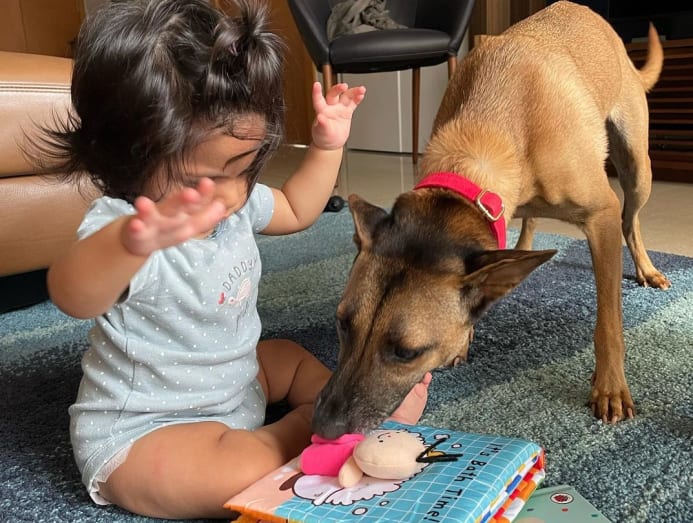
My favourite memory of Hannah is watching her with our dog Nala – these two are my favourite girls. She’s a very fun baby, and she’s brought so much laughter to our home.
As much as motherhood is more challenging than I’d anticipated, the rewards are also a lot more than I could ever have imagined. Sometimes I just want to hug her, as I love her so much. And this is incomparable to anything else.
ADJUSTING TO LIFE AS A STAY-HOME MUM
My husband and I always said that when we have children, we would not plan our lives around theirs. So even after Hannah arrived, we still tried to meet up with friends, and not confine ourselves to our home all the time.
Before falling pregnant in 2019 and adopting Hannah last year, I used to be a lot more active, and as a full-time home baker, I would spend hours in my kitchen baking. These days, I’ve switched to being a full-time stay-at-home mum to Hannah. Now my mixer is in the storeroom!
We also don’t have house help, so if, say, I need to go for a dental appointment, I need to make sure that my parents can come over to help watch Hannah.
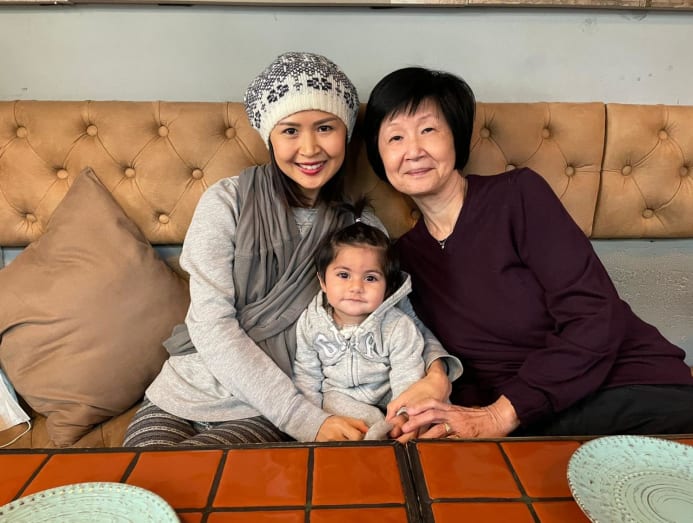
My parents and friends love Hannah a lot. The things that my dad couldn’t do with my brother and I when we were younger due to work, he gets to do them now with Hannah. He would sing her songs, and it’s a very nice sight to see. I’ve never had to buy clothes and books for Hannah too, as my friends would always get them for her.
The most rewarding part is watching Hannah grow, and seeing her develop as an individual. She’s mastered sitting for quite a few months, but there was one day where she suddenly could go from a sitting position to a crawling position.
Sometimes I just want to hug her, as I love her so much. And this is incomparable to anything else.
It’s the small things that make me very happy – like how she has started waving her hands, and watching her play with Nala. As a parent, I’m glad to be there, watching this little life start to flourish. For me, it’s priceless.
EXPLAINING ADOPTION TO HANNAH WHEN SHE’S OLDER
We don’t have a set timeline as to when we’re going to talk to Hannah about being adopted. But when she’s older, we want her to be able to say: “I’ve known this my entire life, this is how I came into this home, and this is my forever home”. We definitely want to be open about it.
I want her to feel empowered and be able to own her story.
My biggest fear is Hannah growing up and feeling insecure about her identity. I’m sure there might be people who’d say not-so-nice things to her, or even question her about her adoption.
Punjabi by birth, Hannah has a German father and a Chinese mother. I’m worried that when she goes to school, her schoolmates might ask her why she doesn’t look like her parents – in case she feels a sense of unbelonging.
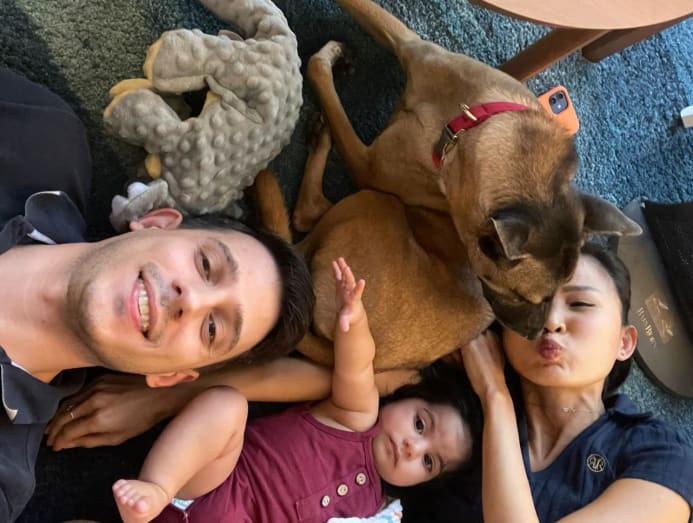
My husband and I want her to grow up having a strong sense of identity. We want to instil in her the ability to explain to other kids her own story, to stand by it, and not be afraid. But it’s also up to us to give her the tools to have that confidence and assuredness, and not worry about what other people think.
I want her to feel empowered and be able to own her story.
If she wants to explore her birth culture in the future, we’re all for it and we’ll support her the entire way. She’s still young now – as parents, we’re here to make sure that her foundation is strong enough to support her for the rest of her life.
HELPING OTHERS WHO HAVE GONE THROUGH THE SAME
My pregnancy loss and going through the adoption process prompted me to start an Instagram account to share my story and help others going through loss, adoption and now, motherhood.
Some people resonated with my story – some are trying to have a baby through IVF, some are going through the adoption process. It helps them to know that they aren’t alone, as whether they’re going through the grieving process or struggling with infertility, it can be very isolating.
Motherhood can come in different ways – for us, being parents was never about just having our own biological children, which is why adoption was always an option.
After losing my triplets, I remember feeling alone, and that it was my fault and the problem lay with me. This is why I’m also doing a Diploma in Psychology Counselling. I feel that there’s little support in Singapore for women who have gone through miscarriage.
It’s not something that people talk about. And people who have never experienced it don’t know how to react to people who've gone through pregnancy loss.
Motherhood can come in different ways – for us, being parents was never about just having our own biological children, which is why adoption was always an option.
I always believe in rainbows, and they come to us in different ways. Sometimes, they may not come to us in the ways we imagined.
For us, it came through adoption. For others, it could come through their godchildren, nieces and nephews – or having their own biological children in time.
CNA Women is a section on CNA Lifestyle that seeks to inform, empower and inspire the modern woman. If you have women-related news, issues and ideas to share with us, email CNAWomen [at] mediacorp.com.sg (CNAWomen[at]mediacorp[dot]com[dot]sg).









